
Cultural exchange between UTAR and Guizhou University
The Department of Soft Skills Competency of Sungai Long Campus collaborated with Guizhou University to organise “China-Malaysia Humanities Exchange International Study Tour”. The event, which was held during the China-ASEAN Education Cooperation Week 2021 (CACEW 2021), aimed to explore the amazing landscape and colourful culture of Malaysia and Guizhou, China. It took place from 30 to 31 October 2021.
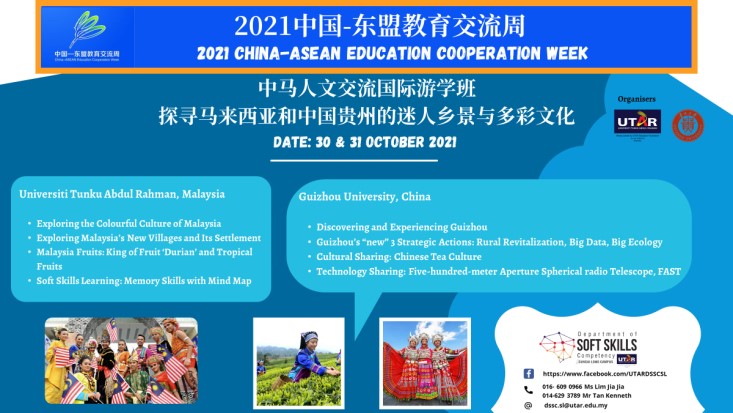
The opening ceremony saw UTAR Vice President for Internationalisation and Academic Development Ir Prof Dr Yow Ho Kwang and Guizhou University Vice President Wu Pan giving their respective speeches. It was followed by another speech by the Deputy Director of the Office of Secretariat of the Organising Committee of CACEW, Chen Wenyi.
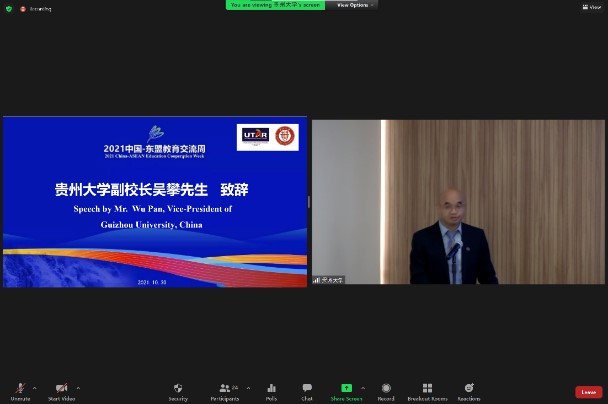
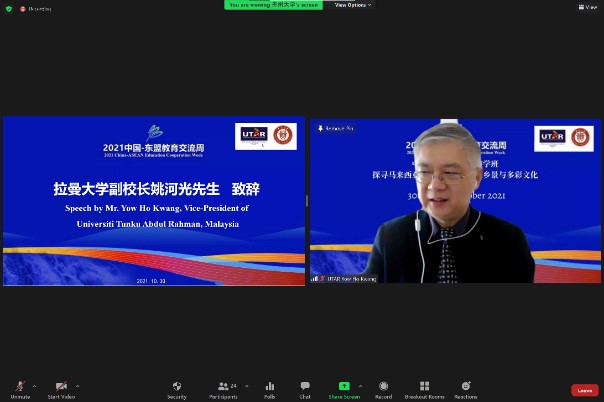
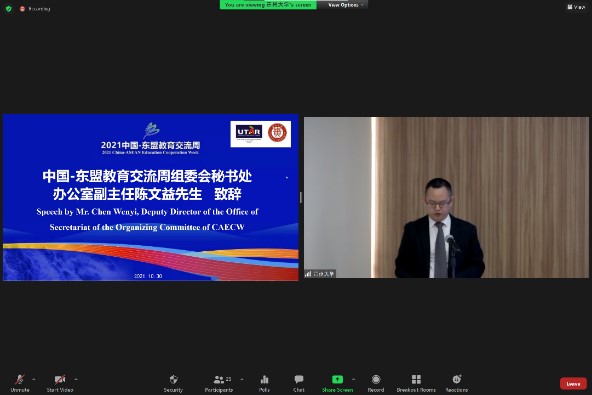
Clockwise from left: Guizhou University Vice President Wu, Prof Yow and Chen giving their respective speeches
A sharing session was held after the opening ceremony. The session saw Tun Tan Cheng Lock Centre for Social and Policy Studies staff Lee Jenn Yuan presenting “An Overview of New Villages in Malaysia (History, Issue and Development)”. During the session, Lee shared about how new villages were formed in Malaysia, the life of the villagers in the early stage and also the difficulties faced by the people in the new villages. He also mentioned that some of the new villages still possess a lot of economic value and that the youngsters need more job opportunities if they wish to stay in the new villages.
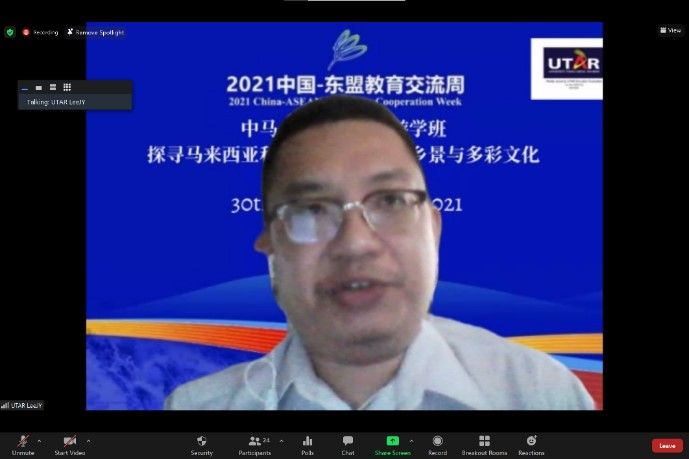
Lee sharing about the new villages in Malaysia
The second speaker, Dean of College of International Education of Guizhou University Assoc Prof Dr Zhang Chengxia presented on “Discovering and Experiencing Guizhou”. She shared the famous places in Guizhou, China and explained its population. According to her, Guizhou has a beautiful landscape with great scenery and mountains. The food in Guizhou is spicy and full of flavours. She also shared the experience of studying at Guizhou University.
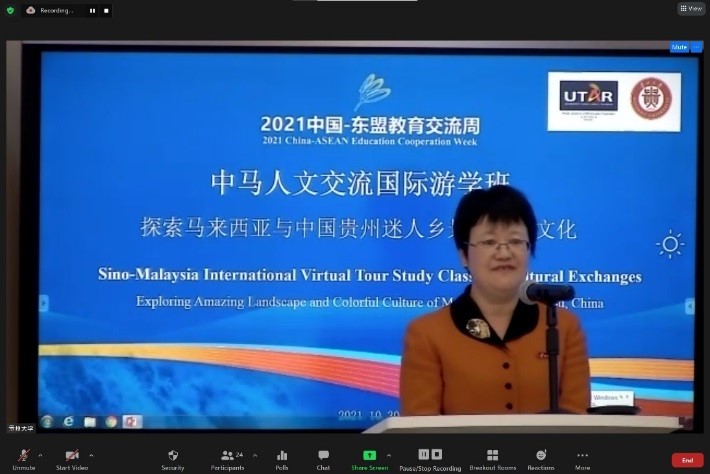
Dr Zhang sharing some famous places in Guizhou
Founder and Executive Chairman of Eco Agri Solution Sdn Bhd and Tafon Agri Sdn Bhd Lai Mei Sheng presented on “Malaysia Fruits: King of Fruit ‘Durian’ and Tropical Fruits”. He elucidated the market and history of durians and shared how to differentiate the durians from Thailand and Malaysia. He also taught participants how to determine the different types of durians and shared their characteristics. Apart from durians, he also introduced other tropical fruits like soursop and rambutan.
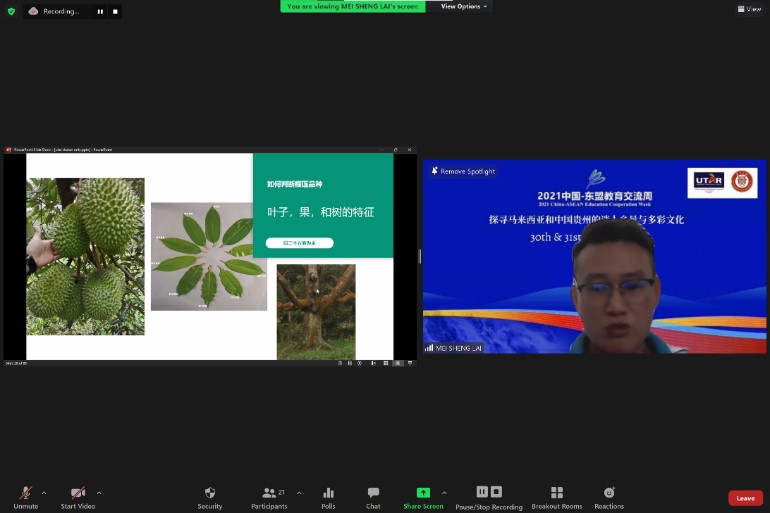
Lai introducing Malaysian’s famous tropical fruit
The last session of the first day saw Assoc Prof Dr Kejian Jin from Guizhou University sharing her expertise in Chinese culture. She showed the tea culture practised by the Chinese through a video and explained how tea is closely related to Chinese culture. According to her, the Chinese drinks tea not only to enjoy the esthetic mood and the environment but also to cultivate manners and virtue. Tea can be used on different occasions like a special ceremony, diplomatic occasion, etc. She also took the opportunity to share with participants the opportunity provided by Guizhou University to international students in experiencing tea making.
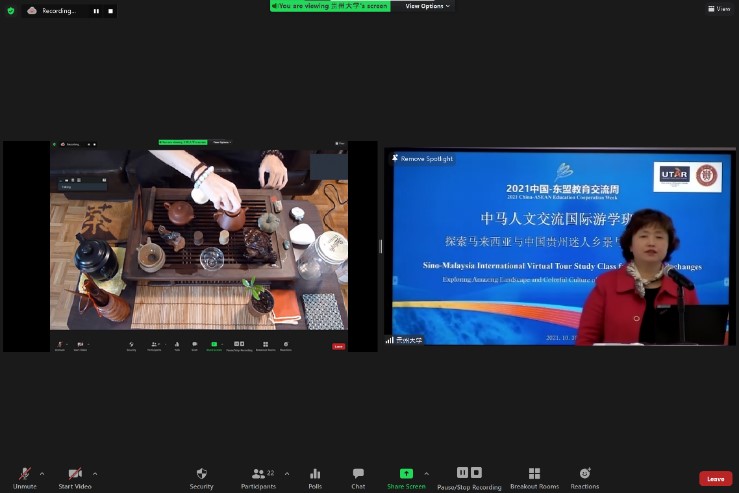
Dr Kejian explaining the steps to make tea
The first session on the second day started with a sharing by UTAR lecturers Nur Farahin binti Bahari and Nurzanatul Amira binti Azizan. The duo presented on “Exploring the Colourful Culture of Malaysia”. Farah started the session by introducing some of the etiquettes and customs practised in Malaysia such as ways of greeting and gifts giving in different ethnic groups. Amira, on the other hand, introduced the diversity of Malaysian cultures such as the costumes and cuisine. Amira also performed a live traditional dance called “Zapin” and taught some simple steps to the participants.
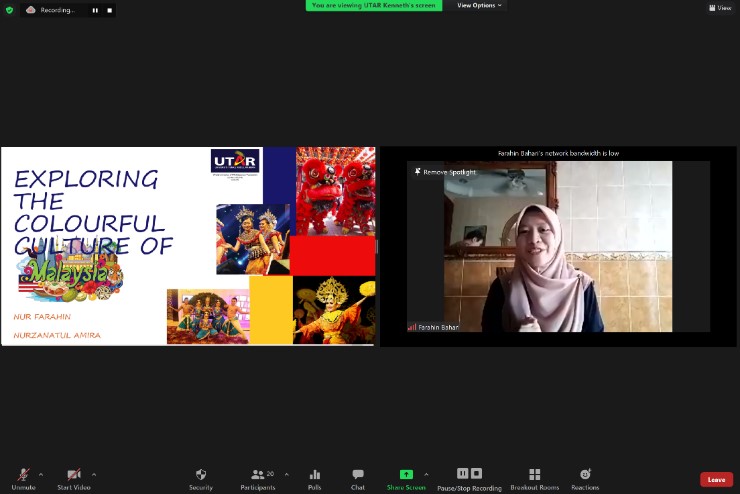
Farah sharing the Malaysian culture
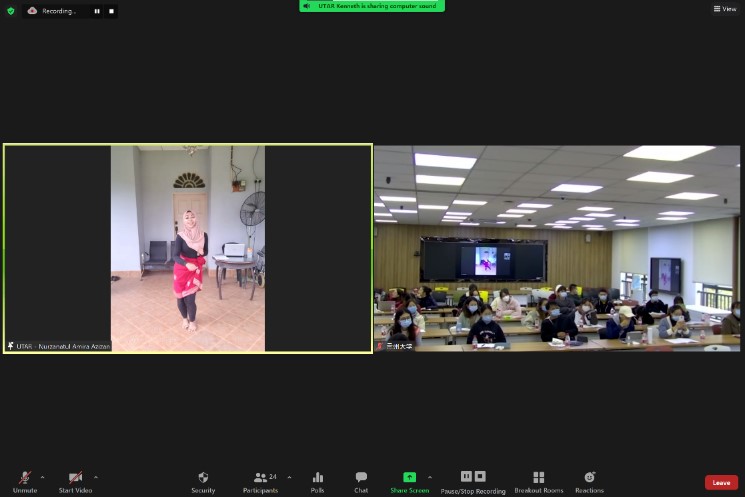
Amira demonstrating the “Zapin” dance
In the “Memory Skills with Mind Map” session, UTAR lecturer Catherine See shared the functions of the left and the right brain. She conducted some interactive activities to make the session more practical and interesting. She mentioned that the main topic should be placed in the centre of the mind map and the content should be categorised into subtopics. According to her, a colourful mind map with images helps the brain to remember information faster and easier.
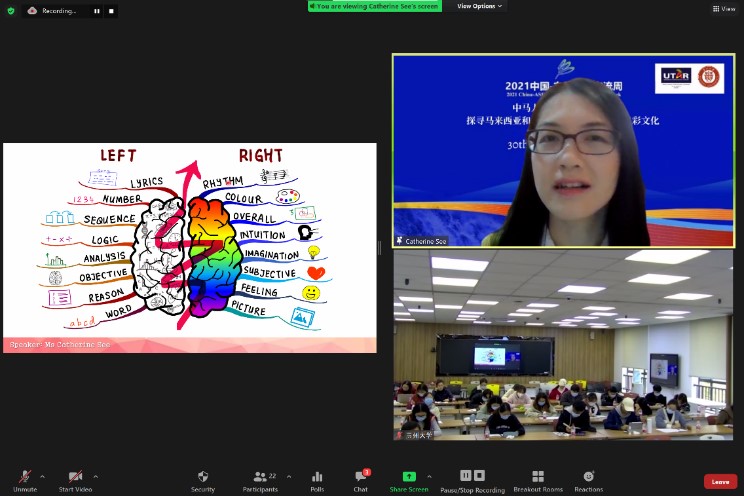
Catherine See sharing the functions of the brain
In Dr Chen Ruina’s sharing, titled “Guizhou’s ‘new’ three strategic actions: rural revitalization, big data, big ecology”, she elucidated on new technology that contributes to farming and poverty alleviation. The farmers in China use apps to secure the demand of buyers to ensure the supply is sufficient, and improve their income. According to her, big data plays an important role even in the rural areas of China. Guizhou is a pilot area for China’s big data industry. She then continued by highlighting the benefits of big data to companies and the health care industry.
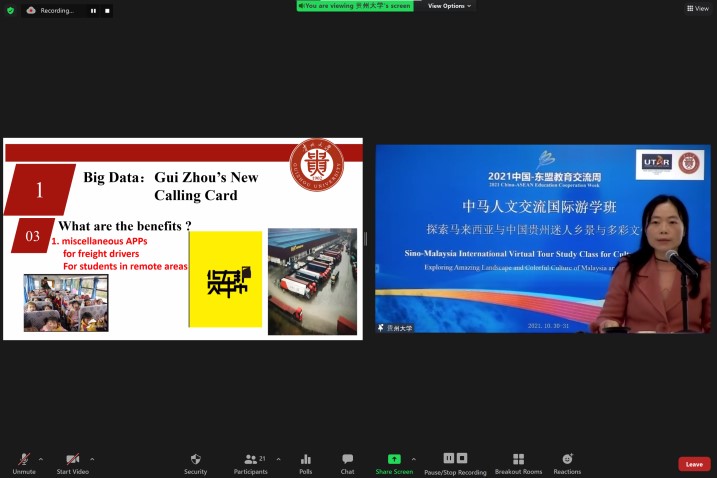
Dr Chen explaining the benefits of utilising big data
The last session saw Dr Zhongzu Zhu Wu, Professor of Astronomy at Guizhou University, presenting on “Five-hundred-meter Aperture Spherical radio Telescope (FAST)”. Dr Wu shared that the telescopes have a different frequency to see different lengths. The reason they use radio astronomy is because the radio waves can penetrate dust and can view the inner galaxy. It can be used to produce sharp images and discover new images in the galaxy. Dr Wu also shared the history of the first receiver that successfully detected radio emission from the Milky Way in 1938. Besides, he shared some examples of the famous telescopes in the world and how they work.
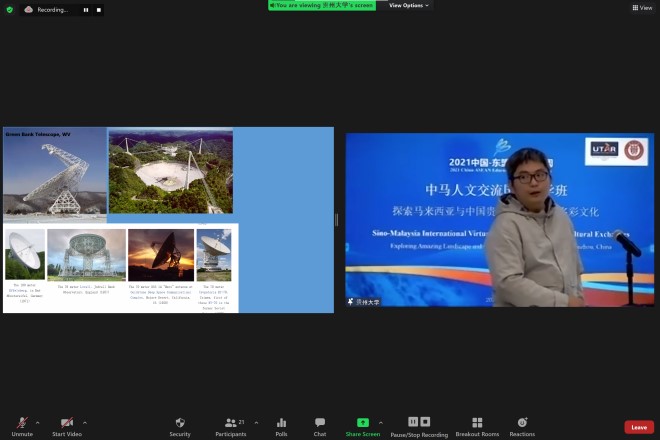
Dr Wu sharing the telescopes in the world
After the sharing session, student representatives from both universities were invited to share their learning experiences. UTAR was represented by Tan Ying Ting while Guizhou University was represented by Shen Qingqing. Besides sharing the valuable lessons they learned throughout the two days, they also thanked the universities for preparing this event for them. Last but not least, Assoc Prof Long Yi from Guizhou University and Assoc Prof Dr Lai Soon Onn from UTAR were invited to give the closing speech. Both universities expressed their hopes to have more collaborations in the future. The cultural exchange session ended with a closing video.
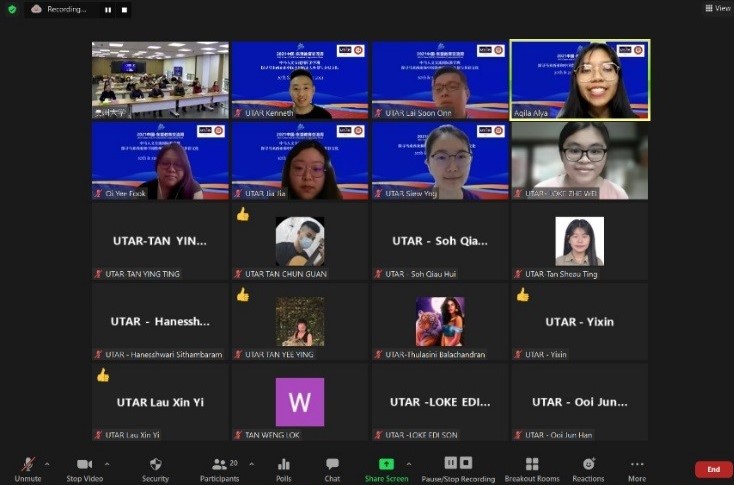
Guizhou University and UTAR students
© 2021 UNIVERSITI TUNKU ABDUL RAHMAN DU012(A).
Wholly owned by UTAR Education Foundation (200201010564(578227-M)) LEGAL STATEMENT TERM OF USAGE PRIVACY NOTICE